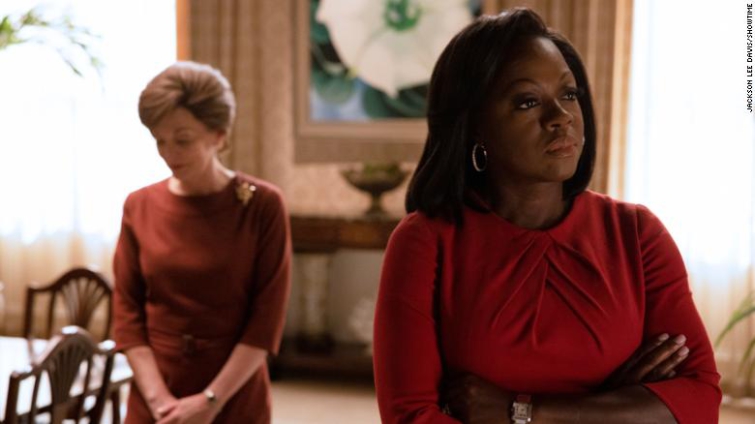The “How to Get Away with Murder” star, 56, described some of the abusive situations she endured growing up, both inside and outside the home, on Monday’s episode of the “Making Space with Hoda Kotb” podcast.
Davis recalled being brutally bullied by young boys, who would chase her and call her racial slurs.
“It was day after day. That’s what it felt like. Was I actually running for my life? Would they actually have killed me? I don’t know about that, but that’s what it felt like,” Davis said.
She described how one boy attacked her, telling her not to call him Black.
“The young boy who, who literally was maybe a shade and a half lighter than me, who said, ‘You don’t call me Black. You don’t call me Black, Viola. You’re Black. I’m Portuguese.’ And he punched me,” she recalled.
“The power of that is just not how I was defined by those eight or nine boys. It’s how the world defined me. It’s that fear of being Black. What Black meant in that, in this powerful caste system we have of how you treat people based on perceived value and worth. And I was worthless. That’s what it told me. I was a child.”
Home was not a safe haven for Davis, whose father physically abused her mother.
“If I felt like I was running for my life from the eight or nine boys, I felt then I had to go into a home where I was running for my life,” she said.
“That’s what it felt like when I would witness the violence between my mom and dad. I keep remembering these moments of violence that even happened at night in the middle of the street. And not one window opened. No one came out to help.”
She said that as a child, she “prayed" no one would see them, but as an adult, she looks back and thinks, “Why didn’t anybody see us or help us?”
Davis described one way, as a young child, she processed the incredible amount of trauma she faced in her daily life.
“I had a whole technique of leaving my body,” she said. “It was pretty awesome, by the way. … I’d always go into the bathroom. And I’d stay there — I’d just sit on the top of the toilet seat. And I would stay there for the longest time. And I had a whole thing where I just would focus on one part of my body."
"Usually my finger. And I shut everything down. And after a certain amount of time, I literally would leave my body and I’d go up to the ceiling, I’d turn around, and I would look at myself,” she added.
The actor likened it to using a fictional device called a Pensieve from the “Harry Potter” series — a magical bowl you can use to store your memories outside your body.
“You would remove a bad thought that was just causing you so much pain. And in order to give yourself some relief, you put it in the bowl,” she said. “That’s what it felt like. So I did that a lot. I dreamed. I tried to achieve. And I kept secrets.”
The Emmy winner explained that for a while, keeping her home life secret helped her to "survive.”
“I didn’t understand anything about secrets actually eroding you,” she said. “That wasn’t a part of my vocabulary, my understanding of human emotion. I just felt like if, if no one knew, then how they would see me is based on what I was achieving outside of my house.”
As she got older, Davis said she continued to separate her private reality from her external achievements.
“I disconnected … like a lot of people who go through trauma, when they compartmentalize,” she said. “That’s what I did. I compartmentalized. I used drive and ambition to replace feeling and vulnerability.”
Ultimately, though, Davis said she realized that she needed to face her pain in order to truly connect with herself and others.
“Here’s what I believe. I believe that what connects us is not just the joy, is not just the achievements. It’s also the sadness. It’s also the pain,” she said. “I feel that if I cannot share my pain with someone else — the pain, the joy, the achievements, then it’s not real connection. But in order for me to share that, for me to have the ability to share that, I have to unpack it."
Latest Stories
-
KNUST’s Prof. Hadrat Yusif calls for central bank independence, cites monetary policy failures
4 minutes -
Armed soldiers allegedly guarding illegal mining site in Anwiaso East Forest Reserve
12 minutes -
The hard work to help the NPP begins now – Bawumia to NPP MPs after shown of support
30 minutes -
This is a strong show of support – Bawumia grateful to NPP MPs for endorsing him for flagbearer
50 minutes -
Zebilla MP calls for urgent action to tackle climate threats and avert food crisis in Northern Ghana
55 minutes -
UniMAC is committed to practical teaching and learning – Prof Yaw Gyau
1 hour -
There was no contract breach in reprinting leaked ballot papers – EC
1 hour -
Over 500 wooden structures destroyed by fire at Tema
1 hour -
JoyNews uncovers galamsey enclave in Anwiaso East forest reserve with over 30 excavators
1 hour -
There is a lot of work to do – Bawumia to NPP MP loyalists as 2028 support swells
1 hour -
Choose words that heal and uplift – Asunafo North MP marks International Day for Countering Hate Speech
1 hour -
Joynews Impact Makers Awards 2025 set for June 28
2 hours -
Skeleton of woman found after going missing for months
2 hours -
Ghana AIDS Commission partners with YEA to sensitise youth on HIV/AIDS
2 hours -
‘Samini knows my heart’ – Stonebwoy clears up ‘beef’ rumours
2 hours

